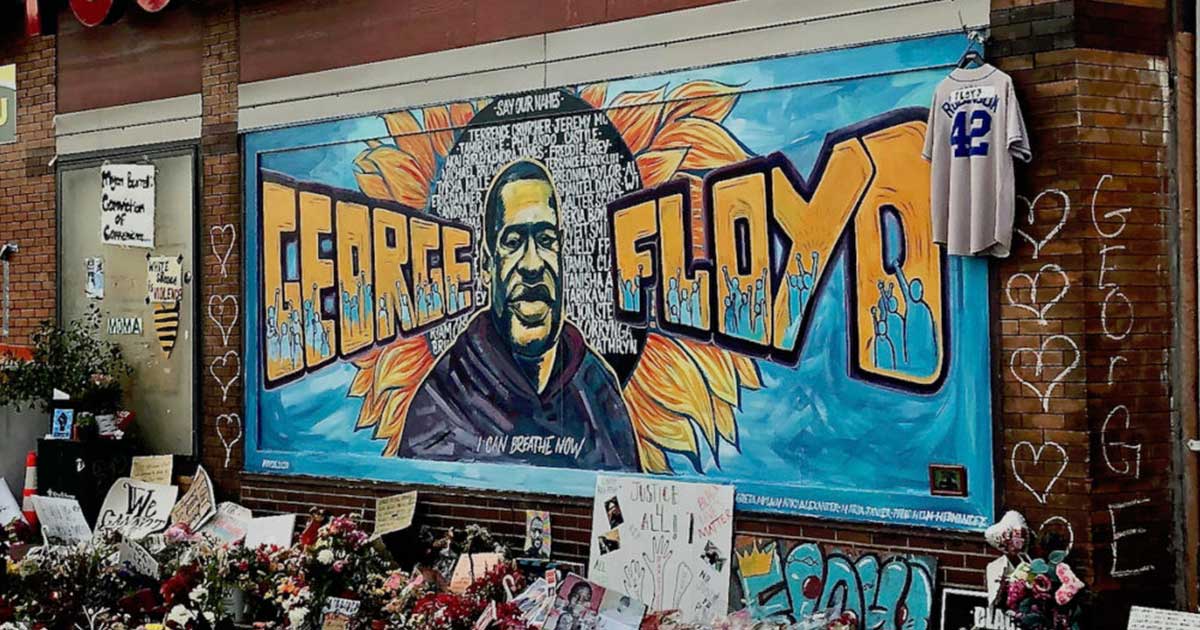Solidarity & Action: Our Role in Creating a More Just World.
This statement is authored by Move Minnesota’s Executive Director Sam Rockwell and Board Chair Ken Rodgers.
As we posted on social media last week, we are heartbroken by the murder of George Floyd at the hands of the Minneapolis Police Department, and joined the chorus of voices in calling for justice and accountability. It was an act of violence and racism, and a reflection of a system that perpetuates acts of violence and racism.
What unfolds in our public spaces is a reflection of our deepest ingrained challenges as a society. Black people have been murdered by police in our public spaces, over and over again. And in the days after George Floyd’s death, law enforcement continued to inflict widespread violence on our community, white people targeted Black and immigrant businesses by lighting fires, and transit service had to be suspended for days, stranding people trying to get to work and get groceries.
To say this is unacceptable is not enough. We must act to change it. As Minnesota’s largest nonprofit transportation advocacy organization, we have a direct role to play in ensuring transit, biking, and walking are welcoming and safe for everyone, especially people who are Black, Indigenous, and people of color. We recognize that as an organization led by white staff, our silence is a form of violence. We must be transparent with how we are taking action and engaging in the ongoing work of anti-racism.
We are committed to dramatically improving transit, as well as walking and biking, because that work is part of toppling a system that relentlessly hurts and holds back communities of color. Our work is urgent, and we have a lot to do to live out our commitment to justice in the weeks and months ahead.
Our Continued Work
We must support immediate needs.
Even as people across the country dive into debate about structural change, the Twin Cities community has immediate needs. Move Minnesota is working to share information about food pick-up sites and other important services. We are also determining how we can deepen our support of organizations working to rebuild community and change community’s relationship to police. Here are just a few ways you can engage with the community organizations doing this immediate work:
- Reference the Twin Cities Aid Map for information on aid services and distribution.
- Help rebuild our communities. The West Broadway Business and Area Coalition is supporting businesses along West Broadway in North Minneapolis. The Lake Street Council launched We Love Lake Street to support local businesses on the Lake Street Corridor. The Neighbors United Funding Collaborative is supporting businesses in St. Paul.
- Strengthen community-led safety initiatives that reduce reliance on police departments by supporting organizations like Reclaim the Block and Root and Restore.
We must support people, not punish them.
Transit systems can only help address the ongoing crisis of racism if transit riders feel and are safe on transit. As George Floyd’s murder and the subsequent police response demonstrate, police presence does not equate to safety for so many people, especially in communities of color. The Minneapolis Police Department is not unique: racist practices and violence are present in every form of law enforcement, including Metro Transit police.
This spring, we helped develop a bill that would have provided alternatives to threatening and unnecessary police presence on transit lines. The bill would have established a team of “transit ambassadors” who could provide support to riders in need—without the threat of sidearms or police affiliation. The bill would have also decriminalized transit fare evasion, eliminating the need for police presence during fare checks. This transit ambassador bill failed to pass because of demands from some legislators for greater police presence on transit. We will push for this critical bill’s reintroduction as soon as possible.
In addition to this bill, we will also continue to look at other ways transit has a direct impact on racial justice. Last week, we asked for and received a public commitment from Metro Transit to not use their vehicles to transport people under arrest, as they did during protests in the wake of Philando Castile’s murder. We know there is more to do to make sure transit remains a place of democracy.
We must increase investments in transportation that strengthen our communities.
Our car-focused transportation system is a racist system: white communities reap the benefits while communities of color deal with the environmental and financial consequences. Investments in transit, biking, and walking are an important part of fighting for racial justice, democratizing our streets, and caring for our community. Improving transit provides people access to opportunity and ensures they can get where they need to go: to school, to work, to their community center, to restaurants and shops, and more.
This year we are fighting for funding to build the B Line and D Line, which run along Lake Street and Chicago Avenue. It is no coincidence that police violence erupted along these very same corridors last week, beginning with the murder of George Floyd at 38th Street and Chicago Avenue. Racism shapes our geography in predictable ways—including where we delay or decline to make positive investments. With the legislature’s failure to pass a bonding bill in May, these lines remain unfunded. There will almost certainly be a special legislative session in the coming weeks, and Move Minnesota will keep working with our supporters and partners to secure these investments. Investing in the B Line and D Line are an important part of rebuilding these communities in a more just way.
You are part of changing this system. Investments like this, and policy changes like creating an ambassador program, are steps in a long-term path toward significant and systemic change. Sign up for our newsletter or invest with a donation to make sure we can keep building momentum for just, sustainable transportation.
We must continue and deepen anti-racism work at personal and organizational levels.
Move Minnesota has spent several years doing internal work to dismantle white supremacy culture. We have a long way to go. Since the beginning of last year, white staff members have used a study and accountability circle to engage in continued learning without creating more harm. Staff members of color have been part of a healing and connection space. We are not experts. We are committed to the continued self-excavation required to dismantle white supremacy culture. We know that the theory of fractal change means that the more we change our individual behaviors and patterns, the more our organizational work will also change. We continue to work to build a staff that reflects the communities we serve, and our board has established a Diversity, Equity, and Inclusion task force to analyze and change board policies, our board’s racial composition, and help develop organizational policies focused on racial justice. This is life-long work for all of us.
Many of Move Minnesota’s staff live in or near communities directly impacted by the violence of the last week. They have been doing what they do best: connecting with community, caring for neighbors, and speaking up for justice. We feel grateful to work with such moral and talented people in this challenging time.
A better world is possible, and it will take all of us working together. Transportation is a critical part of that better world. Until we have a world where people of every skin color can exist free of the threat of violence, we will have work to do.
In solidarity,
Sam Rockwell, Executive Director
Ken Rodgers, Board Chair
Photograph by Alexis M. Murillo.

